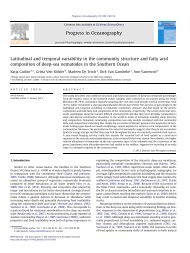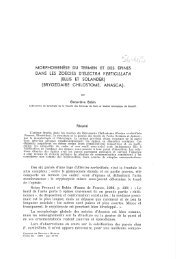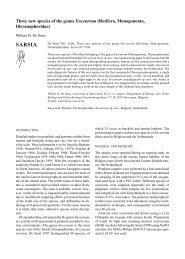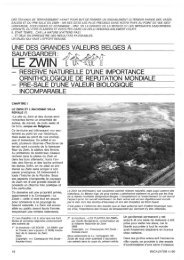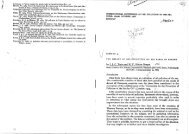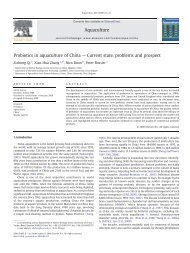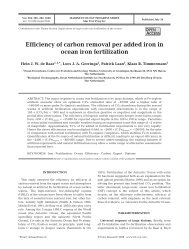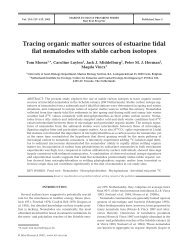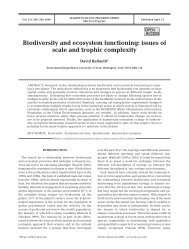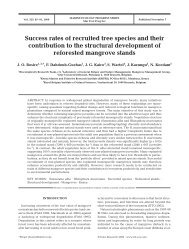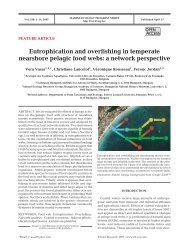- Page 1 and 2:
OFFICE FOR OFFICIAL PUBLICATIONS OF
- Page 3 and 4:
EurOCEAN 2000 The European Conferen
- Page 5 and 6:
TABLE OF CONTENTS (Volumes I - II)
- Page 7 and 8:
Integrated nitrogen model for europ
- Page 9 and 10:
II.1.2 Mehtods for monitoring, fore
- Page 11:
III.2.2 Oceanographic measurement a
- Page 14 and 15: 380
- Page 16 and 17: 382
- Page 18 and 19: Jan van de Graaff Delft University
- Page 20 and 21: dimensional near-field hydrodynamic
- Page 22 and 23: ISVA, turbulence under spilling bre
- Page 24 and 25: Most important results until now: W
- Page 26 and 27: TITLE : PREDICTION OF COHESIVE SEDI
- Page 28 and 29: 394 PREDICTION OF COHESIVE SEDIMENT
- Page 30 and 31: processes of CBS. This is particula
- Page 32 and 33: liquefaction (e.g. induced by wave
- Page 34 and 35: TITLE : COASTAL STUDY OF THREE-DIME
- Page 36 and 37: COASTAL STUDY OF THREE-DIMENSIONAL
- Page 38 and 39: morphological change. Their predict
- Page 40 and 41: O’Connor B.A., and Nicholson J. (
- Page 42 and 43: Professor F Seabra-Santos Universid
- Page 44 and 45: The INDIA Project brings together m
- Page 46 and 47: 412 (CCMS-POL, USC) and bed sonar e
- Page 48 and 49: Prof. D. Myrhaug (NTNU) Norwegian U
- Page 50 and 51: project is focussed on relevant pra
- Page 52 and 53: Modelling results for the flat bed
- Page 54 and 55: engineering firms (coastal engineer
- Page 56 and 57: 422
- Page 58 and 59: Luigi Alberotanza Inst. for the Stu
- Page 60 and 61: All three sites are equipped with i
- Page 62 and 63: 2.3 Assessment of methods for the i
- Page 66 and 67: ‰ B. Model investigations on oper
- Page 68 and 69: modelling strategies and sampling d
- Page 70 and 71: TITLE: A USER-FRIENDLY TOOL FOR THE
- Page 72 and 73: EUROWAVES OVERVIEW A quick illustra
- Page 74 and 75: Figure 1 An example of the EUROWAVE
- Page 76 and 77: Figure 4 Example output field for s
- Page 78 and 79: 444 EUROPEAN RADAR OCEAN SENSING He
- Page 80 and 81: Figure1: WERA current field. Figure
- Page 82 and 83: information in maps has proven to b
- Page 84 and 85: Universidad Politecnica de Cataluny
- Page 86 and 87: esources, such as in ship routing.
- Page 88 and 89: Data Analysis The basic idea of adv
- Page 90 and 91: implemented in system analyses and
- Page 92 and 93: Dr. Claude Millot CNRS LOB/COM B.P.
- Page 94 and 95: MEDITERRANEAN FORECASTING SYSTEM PI
- Page 96 and 97: ADCP and line three mooring consist
- Page 98 and 99: 464 MeteoFrance ftp site Ocean forc
- Page 100 and 101: TITLE: ASSESSMENT OF ANTIFOULING AG
- Page 102 and 103: INTRODUCTION Antifouling paints are
- Page 104 and 105: e.g. diuron was detected in Swedish
- Page 106 and 107: esults suggest effects in the low n
- Page 108 and 109: TITLE: SCOUR AROUND COASTAL STRUCTU
- Page 110 and 111: Conference among others, and will b
- Page 112 and 113: TOPIC 2.4. SEDIMENT TRANSPORT/SCOUR
- Page 114 and 115:
TITEL: VALIDATION OF LOW LEVEL ICE
- Page 116 and 117:
Ice compressive strength tests were
- Page 118 and 119:
subsequent inclined shear failure.
- Page 120 and 121:
486 Fig. 1 Fig. 2
- Page 122 and 123:
ir. M. Willems FC/FH - Flanders Hyd
- Page 124 and 125:
jetty and the armour layer. Out of
- Page 126 and 127:
Both the Zeebrugge and the Petten s
- Page 128 and 129:
alternative methods for the evaluat
- Page 130 and 131:
PORTUGAL Dr. César Andrade Centro
- Page 132 and 133:
Dr. Yolanda Foote Centre for Enviro
- Page 134 and 135:
cliff erosion and the life span of
- Page 136 and 137:
BIOLOGICAL PROCESSES ESPED recognis
- Page 138 and 139:
504
- Page 140 and 141:
506
- Page 142 and 143:
508
- Page 144 and 145:
510 AUTOMATIC IDENTIFICATION AND CH
- Page 146 and 147:
complexity of the data. Once traine
- Page 148 and 149:
INTEGRATING IDENTIFICATION AND CHAR
- Page 150 and 151:
TITLE: SEDIMENT IDENTIFICATION FOR
- Page 152 and 153:
518 SEDIMENT IDENTIFICATION FOR GEO
- Page 154 and 155:
The way to sense the marine environ
- Page 156 and 157:
6. Data processing and inversion (L
- Page 158 and 159:
TITLE: TRANSMISSION OF ELECTROMAGNE
- Page 160 and 161:
526 Attenuation dB/m 10 4 10 3 10 2
- Page 162 and 163:
Figure 2 Spectral response for wave
- Page 164 and 165:
TITLE: IMPROVED MICROSTRUCTURE MEAS
- Page 166 and 167:
IMPROVED MICROSTRUCTURE MEASUREMENT
- Page 168 and 169:
committee proposed the new establis
- Page 170 and 171:
of the profiler. Thus, the ACC98 se
- Page 172 and 173:
Figure 3b: Measurements of and diss
- Page 174 and 175:
TITLE: APPLICATIONS OF 3-DIMENSIONA
- Page 176 and 177:
2. OBJECTIVES The first objective o
- Page 178 and 179:
to demonstrate a capability for col
- Page 180 and 181:
546 ADIAC: DIATOMS GO DIGITAL M. Ba
- Page 182 and 183:
SLIDE SCANNING FOR DIATOM LOCALIZAT
- Page 184 and 185:
performance of normal PCs and the a
- Page 186 and 187:
TITLE : SUBSEA TOOLS APPLICATION RE
- Page 188 and 189:
554 SUBSEA TOOLS: A CRAFT PROJECT T
- Page 190 and 191:
RESULTS The deliverable is a multi-
- Page 192 and 193:
TITLE: DINOFLAGELLATE CATEGORISATIO
- Page 194 and 195:
1998) has simplified the developmen
- Page 196 and 197:
Fig. 3: Example specimen images 562
- Page 198 and 199:
REFERENCES Culverhouse PF, Ellis RE
- Page 200 and 201:
566
- Page 202 and 203:
INTRODUCTION 568 LOTUS Long Range T
- Page 204 and 205:
DESIGN OF EXPERIMENTAL EQUIPMENT Th
- Page 206 and 207:
Figure 2: Complex base-band impulse
- Page 208 and 209:
ACKNOWLEDGEMENTS This work is funde
- Page 210 and 211:
576 THE SEISCAN INITIATIVE: SEISMIC
- Page 212 and 213:
een fed through to the scanning cen
- Page 214 and 215:
Data scanned At the time of writing
- Page 216 and 217:
The digital transcription forms an
- Page 218 and 219:
584 SUMMARY OF SWAN PROJECT OBJECTI
- Page 220 and 221:
Apart from suffering from ISI, a mu
- Page 222 and 223:
TITLE : LONG-RANGE SHALLOW-WATER RO
- Page 224 and 225:
OBJECTIVES Present communication sy
- Page 226 and 227:
RESULTS OF THE DATA ANALYSIS Analys
- Page 228 and 229:
TITLE : UNDERWATER DIVING INTERPERS
- Page 230 and 231:
Orientation The electrical field ap
- Page 232 and 233:
[6] Virr LE (1987) « Role of elect
- Page 234 and 235:
TITLE : ELECTROACOUSTIC PROTOTYPE F
- Page 236 and 237:
specimen of bottlenose dolphin capt
- Page 238 and 239:
REFERENCES Cameron, G. 1999. Report
- Page 240 and 241:
606
- Page 242 and 243:
608 HIGH RESOLUTION IN SITU HOLOGRA
- Page 244 and 245:
due to thermal expansion. The power
- Page 246 and 247:
612 200 mm stages with optics and C
- Page 248 and 249:
III.1.4 Submarine geotechnics 615
- Page 250 and 251:
TITLE : GROUTED OFFSHORE PILES FOR
- Page 252 and 253:
Solution One solution to this probl
- Page 254 and 255:
technology. Harbour works, wharves,
- Page 256 and 257:
• A major characterisation progra
- Page 258 and 259:
VERY HIGH RESOLUTION MARINE 3D SEIS
- Page 260 and 261:
Monaco harbour (France) A very comp
- Page 262 and 263:
End-users highlighted the current,
- Page 264 and 265:
C. Smith Institute of Marine Biolog
- Page 266 and 267:
package for Automatic Mobile Invest
- Page 268 and 269:
The operation of ARAMIS The typical
- Page 270 and 271:
• ROV landing on the sea bottom t
- Page 272 and 273:
EURODOCKER - A UNIVERSAL DOCKING -
- Page 274 and 275:
RESULTS: EURODOCKER SYSTEM DESCRIPT
- Page 276 and 277:
THE PROTOTYPE The Construction of t
- Page 278 and 279:
TITLE : LIGHTWEIGHT COMPOSITE PRESS
- Page 280 and 281:
OBJECTIVES: The aim of the project
- Page 282 and 283:
TITLE : ADVANCED SYSTEM INTEGRATION
- Page 284 and 285:
651 Differential GPS - Reference St
- Page 286 and 287:
Figure 3.a The DELFIM ASC Figure 3.
- Page 288 and 289:
place vertically in the framework o
- Page 290 and 291:
[8] A. Pascoal, . P. Oliveira, C. S
- Page 292 and 293:
Eng. J.-M.Coudeville ORCA Instrumen
- Page 294 and 295:
THE GEOSTAR PROTOTYPE GEOSTAR proto
- Page 296 and 297:
CONCLUSIONS GEOSTAR 2 is a project
- Page 298 and 299:
goals of the project and results of
- Page 300 and 301:
III.2.2. Oceanographic measurement
- Page 302 and 303:
TITLE : GAS HYDRATE AUTOCLAVE CORIN
- Page 304 and 305:
initially most important parameters
- Page 306 and 307:
3.4 Finalization of delayed tasks i
- Page 308 and 309:
Dr. Margaret Yelland Southampton Oc
- Page 310 and 311:
RESULTS FROM THE FIRST PROJECT PERI
- Page 312 and 313:
Taylor,P. K. and M. J. Yelland, 199
- Page 314 and 315:
TRACE METAL MONOTORING IN SURFACE M
- Page 316 and 317:
THE FLUORESCENCE SIGNAL OBTAINED WH
- Page 318 and 319:
The reaction of 6-mercaptopurine, l
- Page 320 and 321:
TITLE : OCEAN TOMOGRAPHY OPERATIONA
- Page 322 and 323:
The OCTOPUS project has been runnin
- Page 324 and 325:
Fig. 2: Typical TOMOLAB input: Tomo
- Page 326 and 327:
The establishment of a data bank fo
- Page 328 and 329:
TITLE: SPECTROSCOPY USING OPTICAL F
- Page 330 and 331:
The overall objective of the SOFIE
- Page 332 and 333:
devoted to investigate the behaviou
- Page 334 and 335:
TITLE : DEVELOPMENT AND TEST OF AN
- Page 336 and 337:
in-situ (Nitrate, Nitrite, Ammonia,
- Page 338 and 339:
Apart from the measurements made in
- Page 340 and 341:
MANUFACTURE OF CALIBRATION SOLUTION
- Page 342 and 343:
einz-Detlef Kronfeldt, Heinar Schmi



